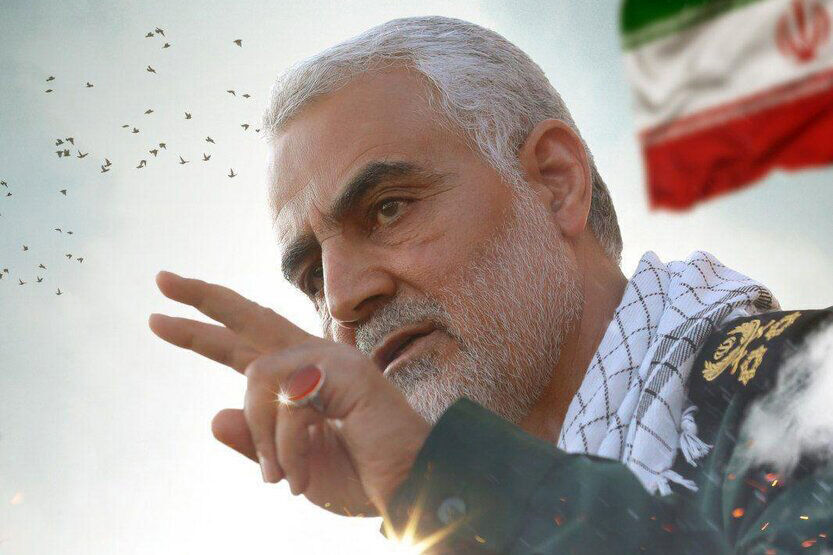Alwaght- Two years after the apparently cowardly assassination of Iran's top General Qassem Soleimani and his Iraqi comrade Abu Mahdi al-Muhandis by a direct order from Donald Trump, revisiting the regional situation and the goals behind the assassination look quite crucial.
Two years after the widely-condemned crime, a question presents itself : Have the Americans realized the goals they sought behind the assassination of the two anti-terror commanders?
Alwaght has talked to Jaafar Ghanadbashi, an Iranian expert of West Asian affairs, seeking an answer to this question.
Four goals driving the assassination
Answering the question about how far the Americans and the enemies of the Axis of Resistance, a powerful Iran-led regional bloc struggling against Western domineering policies, have gone in realizing their aims from assassination of General Soleimani, Mr Ghanadbashi said that the Americans designed the assassination plan for several important reasons.
Firstly, General Soleimani was the mastermind of the Axis of Resistance who had put high on agenda full liberation of Palestine. So, the Americans and Israelis saw him the main threat to their evil schemes. He added that we need to take into consideration that top American objective in the region is preservation of the Israeli security and very existence. So, by assassinating General Soleimani, they thought they eliminated the main source of threat to Tel Aviv."
Secondly, the Americans committed the crime because the general shattered Western-sponsored ISIS project. In other words, the creation of gruesome ISIS terrorist group was a plan the US drew to undermine the regional nations especially the Resistance camp, which includes Iran, Syria, Iraq, Lebanon, Yemen, and Palestine. But thanks to General Soleimani's timely response and his courageous command, the self-proclaimed ISIS caliphate, led by Abu Bakr al-Baghdadi, was shown the way to the ash heap of history. By creating ISIS, the Americans intended to promote a violent and hateful picture of Islam but, again, General Soleimani thwarted the plan. The Americans tried, via the assassination, to pursue crisis project using ISIS.
Thirdly, the Americans have strengthened and maintained their presence in West Asia region for the past two decades under the pretext of fighting terrorism, but General Soleimani, by destroying terrorist groups and repelling their threats from the region, took from US occupying forces the excuse to stay in the region. With the elimination of ISIS, the philosophy on which the justification for American presence in the region rested, went meaningless.
Fourthly, the Americans targeted the general because he had crafted a unique collective security mechanism thanks to which there was no need to the US regional presence. Actually, the resistance circles he set up gave birth to a collective security system across the region to fight terrorism.
General Soleimani assassination dealt a big blow to the global US legitimacy
Mr Ghanadbashi continued that there is no doubt that the Americans sustained a tactical and strategic defeat at minor and major levels after the assassination. At the minor level, they never thought that General Soleimani was of such a great popularity not only inside Iran but also across the region and even the world. The attack dealt a major blow to the US legitimacy and image at the global stage as it targeted a major anti-terror figure.
Also, the anti-Resistance camp media campaigns run by Western media outlets met their total failure. In recent decades, the Western media has carried out a lot of propaganda that the Axis of Resistance has no popular support and its only power lies in military recruitment. But the assassination of General Soleimani showed how popular this thought and camp is in the region. Holding various rallies in the region and even in Latin America in memory of the general showed the extent to which the Axis of Resistance is deeply rooted and has popular support.
US expulsion demand now an undeniable regional reality
Mr Ghandbashi continued that at a major level the general's master stroke was creation of a regional discourse with two pillars: people and conformity to regional culture. Contrary to this, the Americans have worked to instill the Western liberal culture in the region. After the assassination, the discourse of resistance founded by General Soleimani foisted a heavy loss on the liberal culture of the West in the region. This means stronger Axis of Resistance.
The conclusion is that, Mr Ghandbashi asserted, just against the American assumptions, the assassination not only failed to boost the American presence in the region but also now the demand for the US withdrawal is an absolute and undeniable reality. In the past, the Americans presented as justification for their presence the counterterrorism fight but thanks to General Soleimani there is no longer such a threat as terrorism in the region. Now a culture of resistance is a reality embodied by the Resistance camp's groups and this means a major defeat to all of evil American goals in the region.



























